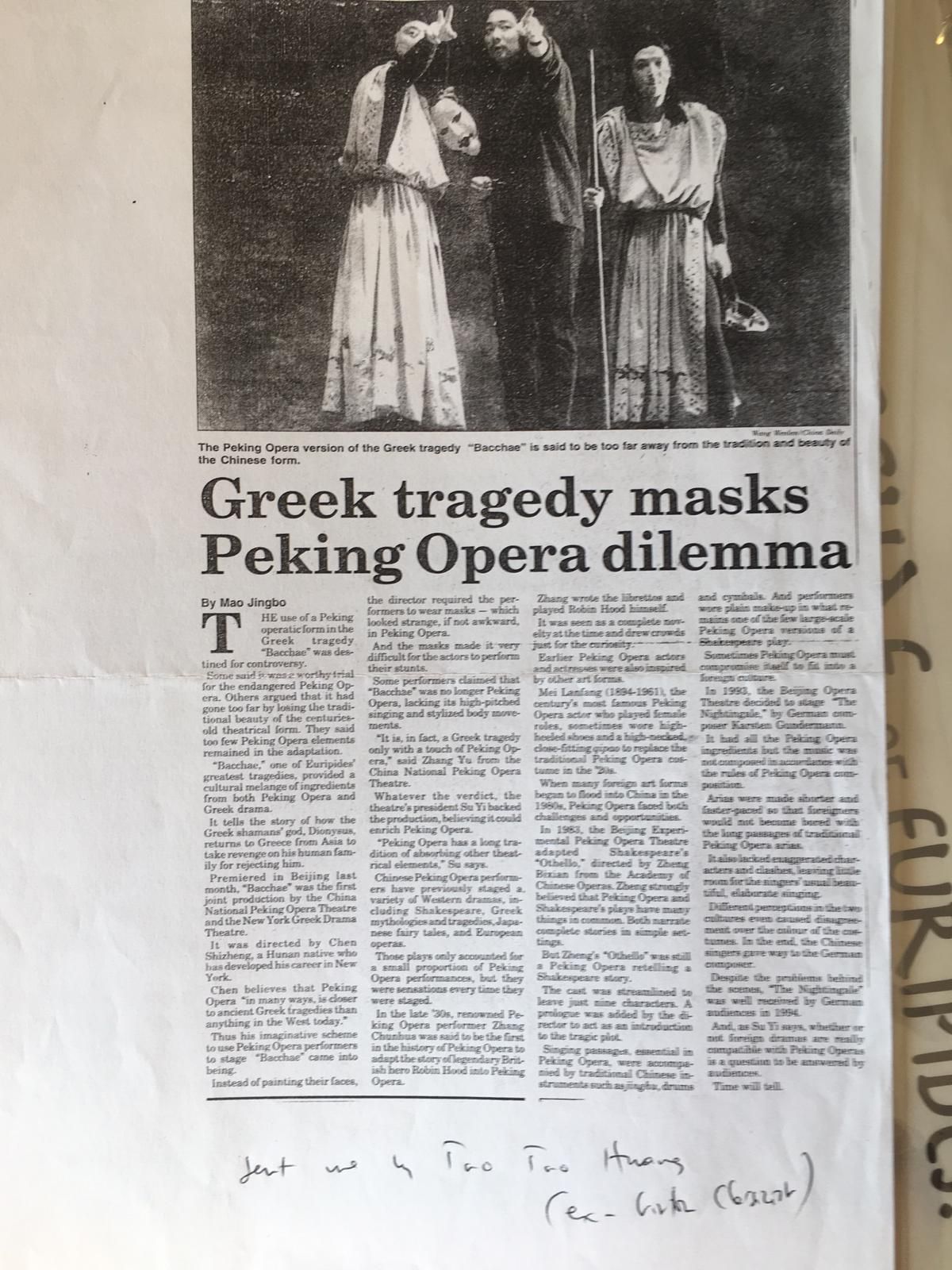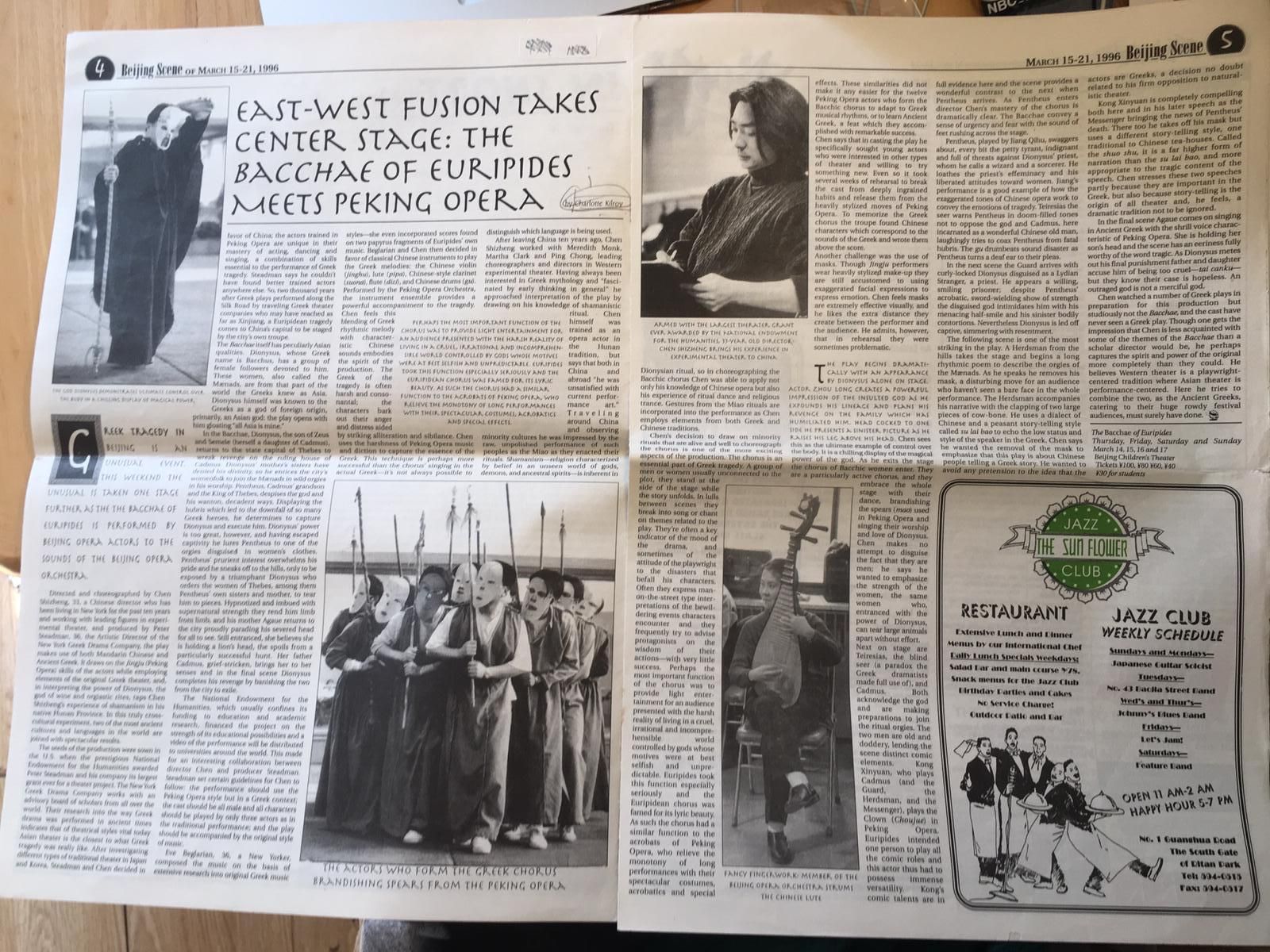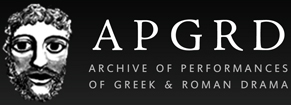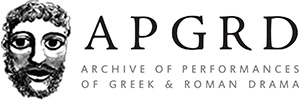The Archive in 100 Objects
 Dr Marchella Ward (Tinsley Outreach Fellow, Oxford) starts her discussion with a programme cover for Manara Productions' Hecuba (1987) and reviews for the Chinese National Beijing Opera's 1996 Bacchae [archive items 13618, 615, and 922 respectively].
Dr Marchella Ward (Tinsley Outreach Fellow, Oxford) starts her discussion with a programme cover for Manara Productions' Hecuba (1987) and reviews for the Chinese National Beijing Opera's 1996 Bacchae [archive items 13618, 615, and 922 respectively].
Listen to an accompanying podcast episode featuring Marchella Ward and Michael Scott >>

In advance of recording the podcast with Professor Michael Scott, I was asked to select an object or two from the APGRD archive to form the basis of the discussion. I chose objects relating to two productions: a version of Euripides’ Hecuba produced in Santa Monica in 1987 and directed by the Syrian-Palestinian director Lamis Khalaf, and an operatic production of Euripides’ Bacchae co-produced in 1996 by the New York Greek Drama Company and the China National Beijing Opera Theatre. The newspaper reviews of both productions had something in common: both set up the Greek plays as artefacts belonging to a great history of ‘Western Civilisation’, and expressed surprise that these Greek tragedies might be able to say anything meaningful in contexts described by the reviewers in both cases as ‘Eastern’.
It is relatively easy for anyone who has studied these two plays to prove that the reviewers are mistaken – it is simply wrong to think of these two ancient plays as great masterpieces of the so-called ‘West’. Hecuba is a Trojan queen, and the play is set in a Greek camp somewhere along the shoreline of Thrace; and the Bacchae is famously the story of a god who arrives from a non-specified place in Asia. These plays are only ‘Western’ in the sense that they have been co-opted as part of the so-called Western tradition, but there is nothing about them that makes them naturally more relevant to modern Europe than they might be to modern day China, Palestine or Syria.
Classics and the so-called West
 The fact that the newspaper reviewers of these productions are incorrect, though, is not really the point. They are incorrect in assuming that ancient Greek drama has natural relevance only for the so-called ‘West’, but factual incorrectness is the very least of the problems here. Ancient Greece and Rome have frequently over the course of their long history been weaponised by groups who wanted to set them up as the beginnings of what they called ‘Western Civilisation’, and as the mythical pre-history for white Europeans. This does not come about by accident, but reflects the underlying intellectual logic of white supremacy (see, '“Western Civilization” means Classics…and White Supremacy' Pharos 25 Jan 2019). When I use the term ‘white supremacy’, I don’t mean, of course, that all those who like the idea of Western Civilisation are also going on racist marches, committing acts of violence against people of colour, or logging into alt-right chat rooms to plot hate crimes (though the extent to which people who do those things adore the idea that they are defending the legacy of ‘the West’ is not irrelevant here). White supremacy is, as Layla Saad explains, “a racist ideology that is based upon the belief that white people are superior in many ways to people of other races and that therefore, white people should be dominant”. It is an ideology that finds its way into ways of thinking, as much as into specific actions.
The fact that the newspaper reviewers of these productions are incorrect, though, is not really the point. They are incorrect in assuming that ancient Greek drama has natural relevance only for the so-called ‘West’, but factual incorrectness is the very least of the problems here. Ancient Greece and Rome have frequently over the course of their long history been weaponised by groups who wanted to set them up as the beginnings of what they called ‘Western Civilisation’, and as the mythical pre-history for white Europeans. This does not come about by accident, but reflects the underlying intellectual logic of white supremacy (see, '“Western Civilization” means Classics…and White Supremacy' Pharos 25 Jan 2019). When I use the term ‘white supremacy’, I don’t mean, of course, that all those who like the idea of Western Civilisation are also going on racist marches, committing acts of violence against people of colour, or logging into alt-right chat rooms to plot hate crimes (though the extent to which people who do those things adore the idea that they are defending the legacy of ‘the West’ is not irrelevant here). White supremacy is, as Layla Saad explains, “a racist ideology that is based upon the belief that white people are superior in many ways to people of other races and that therefore, white people should be dominant”. It is an ideology that finds its way into ways of thinking, as much as into specific actions.
 But perhaps the most dangerous thing about white supremacy is that you don’t have to intend to perpetuate it in order to be complicit in it – it is part of the legal, social and educational institutions that make up the world around us. Some people prefer to use softer terms to describe the institutional operation of white supremacy. Those people might refer, for instance, to ‘unconscious bias’ or to ‘white privilege’ or ‘white fragility’ and save the use of the term ‘white supremacy’ for Neo-Nazis and other violent hate groups. But white supremacy isn’t a fringe concept, and to treat it as a concept that is only relevant when it is intentional, violent and explicit stops us from seeing how it operates in ideas that do not announce themselves to us explicitly as racism. And in a field like Classics that is made up overwhelmingly of white scholars and students, we run the risk, if we don’t confront it, of not realising that white supremacy is at the centre even of concepts we might think of as totally arbitrary and benign – like the West, for instance.
But perhaps the most dangerous thing about white supremacy is that you don’t have to intend to perpetuate it in order to be complicit in it – it is part of the legal, social and educational institutions that make up the world around us. Some people prefer to use softer terms to describe the institutional operation of white supremacy. Those people might refer, for instance, to ‘unconscious bias’ or to ‘white privilege’ or ‘white fragility’ and save the use of the term ‘white supremacy’ for Neo-Nazis and other violent hate groups. But white supremacy isn’t a fringe concept, and to treat it as a concept that is only relevant when it is intentional, violent and explicit stops us from seeing how it operates in ideas that do not announce themselves to us explicitly as racism. And in a field like Classics that is made up overwhelmingly of white scholars and students, we run the risk, if we don’t confront it, of not realising that white supremacy is at the centre even of concepts we might think of as totally arbitrary and benign – like the West, for instance.
The idea that the field of Classics has a special relationship with the so-called West is something that classicists often default to when they are asked to make the case for the importance of their subject to the world outside of academia (something classicists are often required to do). But classicists are not the only ones who feel that something is at stake in assuring the world that their objects of study have special relevance for so-called Western Civilisation. In 2016 the white supremacist hate group Identity Evropa (now known as the American Identity Movement) circulated posters around college campuses in the US bearing slogans such as “Protect Your Heritage” superimposed onto an image of the Roman copy of a Greek statue, Apollo Belvedere. This particular mis-use of a classical image for explicitly racist and white supremacist purposes has been much discussed (it features in the opening paragraphs of Donna Zuckerberg’s Not All Dead White Men (2018); the long and sordid history of the use of an image of Apollo Belvedere for racist pseudo science has been explained by Denise Eileen McCoskey in her book Race: Antiquity and its Legacy (2012); and an image of Apollo features on the front cover of Angela Saini’s 2019 book Superior: the Return of Race Science). I will not repeat the story of the relationship between the head of Apollo Belvedere, craniometry, eugenics and the development of racist pseudo-science here, but the question of who antiquity belongs to has been a frequent battle-ground among those who sought to set the ancient world at the head of a Western tradition belonging in particular to white Europeans. Classics and the supremacy of the West are locked into a kind of feedback loop: when the discipline is menaced with threats of ‘irrelevance’, classicists will tend to say that their objects of study hold the keys to Western Civilisation; and when they do this, they give fuel to the idea that Western Civilisation is real, or that its keys can confer power on those who hold them.
"East vs. West"
The idea that the world is split into an East and a West, two warring blocks with opposing cultures, has been carefully engineered into the position of seeming natural at various moments in history. One such moment is the mid-1990s, when this racist ideology was presented as objective fact by two books that came out within a short space of time: Samuel Huntington’s The Clash of Civilisations (published first as an article in 1993 and as a book-length version in 1996) and Bernard Lewis’ Islam and the West (1993). Both books assume a cultural supremacy for the West on the basis of its special relationship with classical antiquity, but are also committed to excluding Muslims from the possibility of Greco-Roman influence. Lewis had written an article in September of 1990 for The Atlantic in which he argued for the existence of what he characterises as a Muslim “hatred” for the West that “goes beyond hostility to specific interests or actions or policies or even countries and becomes a rejection of Western civilisation as such, not only what it does but what it is, and the principles and values that it practices and professes”. There is much to be said about the way in which the islamophobia of these two academics shaped the idea of the West, particularly in the run up to the Iraq War, of which Lewis was an ardent supporter (those interested in some of this conversation might want to read Hamid Dabashi’s 2018 article 'On Bernard Lewis and His Extraordinary Capacity for Getting Everything Wrong', or look further back to Lewis’ confrontations with Edward Saïd in the pages of the New York Review of Books). Here, suffice it to say that by the mid-90s the idea that the world consisted of two warring blocks, and that there was such a thing as the ‘West’ that was under threat from an 'East', caricatured as a place of violent Islamism, was not only the modus operandi of violent extremists (the Islamic State love the idea that there is something definite that can be called ‘Western Civilisation’ as much as white supremacists), but had been carefully manoeuvred into a position where this explicitly racist ideology masqueraded as ‘natural’ or ‘normal’ in popular discourse.
The idea of this natural division between the superior West and the violent East is beginning to lose some of its shine. In Classics, the varied studies of Martin Bernal, Edith Hall and, more recently Rebecca Futo Kennedy and others have shown some of the ways in which a perceived special relationship with antiquity has been used to bolster the xenophobic idea of the so-called West’s superiority. Outside of Classics, the idea that West is a category constructed for reasons of political expediency is beginning to be popularised by Kwame Anthony Appiah, among others. Simply arguing that those who position the Classics as of special relevance for the West are wrong, incorrect or mistaken, however, will not be enough. Identity Evropa and those who support them do not care whether or not their ancient history is accurate. Their position is not some kind of innocent mistake, and we cannot remove the white supremacist power from the concept of the West simply by retorting that the concept is factually incorrect. We will need to do more than simply state that the white supremacist narrative of the West’s superiority is untrue.
Classics will need to reckon with the fact that for too long it has made the case for its own universal relevance on the grounds that it provided the keys to understand the prehistory of Europe and the US. Those who work in the field will need to expose the work that the narrative of Western Civilisation has done to centre their own field as universal and relevant, and will need to work actively to find new ways of producing knowledge about antiquity that do not rely on the falsely constructed, racist, islamophobic and white supremacist binary of East vs. West. We are in luck, though, because Classics has long been equipped with the methods of critical reading and critical historiography required to take apart ideologically laden narratives when it encounters them in the distant past – it will not be so great a leap to turn those methods and modes of reading on the discipline itself.
Find out more
Much remains to be written and read on this subject, and I am aware as I write this that two white scholars of the ancient world holding a discussion about the ‘East and the West’ does little to undermine the cultural and intellectual capital too often attributed to white classicists in popular discourse. Below are some more thinkers, classicists, historians, writers and scholars who have made crucial contributions to this conversation, whose work I recommend as a starting point for anyone who wants to get involved in finding ways to study the ancient world without simply fuelling the fires of white supremacy or entrenching the narrative of East vs. West:
- Sumaya Kassim, The Museum Will Not Be Decolonised (2017)
- Michael Mumisa, Black History and the Intellectual Golden Triangle (2016)
- Dan-el Padilla Peralta, Classics Beyond the Pale (2017)
- Angela Saini, Superior: The Return of Race Science (2019)
- Mathura Umachandran, Fragile, Handle with Care: On White Classicists (2017)
- The Pharos Project, cataloguing the appropriations of antiquity by hate groups online

